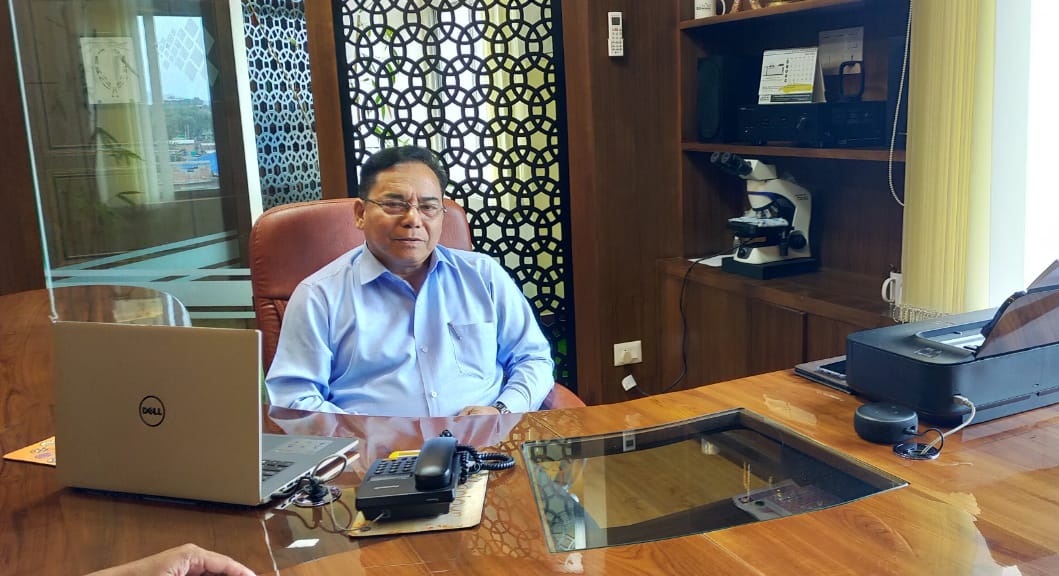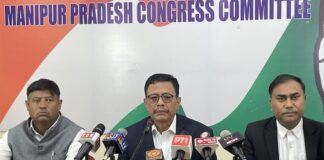Imphal: As Manipur continues to battle the second wave of coronavirus, also known as SARS-CoV-2, pandemic from early May 2021, many experts and policymakers have given various opinions on the reasons why the state is still struggling in controlling the pathogen.
Unlike other states in the northeastern region and the country as a whole, Manipur reports one of the highest mortality rates at 1.5 per cent, with positive rates touching around 13 per cent on average, against the national positivity rate of 2.3 per cent. The disease has infected over 1.09 lakh people and claimed nearly 1700 lives so far since the pandemic began early in 2020.
Although it would be wrong to assume that the state government hasn’t done anything to stem the tide of the disease, albeit a little late, fighting an invisible virus itself is a difficult task. However, what most experts agree is that timely intervention and human behaviour are the most important factors if we want to put an end to this crisis, which some people describe as the ‘pandemic of the century’.
Dr Thangjam Dhabali, Chairman & Managing Director at Babina Group of Companies, sheds light on what we know now about COVID-19 in communities and why the numbers of infections increase during certain times.
Whilst Dr Dhabli agreed with the fact that both the mortality and positivity rate in Manipur is ‘slightly’ higher than the national average, violation of Covid appropriate behaviour by the people is the most important reason for the high positivity rate in the state. Moreover, according to him, home isolation in a house which is not suitable for quarantine is equally responsible for the rapid spread of the virus.
Lapses in contact tracing and proper follow-up of patients in home isolation are also contributing to increasing positivity and mortality rate, respectively, he said.
Following the Covid appropriate behaviour in letter and spirit by the public and government’s proper planning and policy implementation at the ground level are equally important, Dr Dhabli reasoned.
Dr Dhabali, however, doesn’t agree with the argument that there was mismanagement from the government side, stating that this happens even in places with the best healthcare infrastructure. When cases overwhelm, management becomes even more difficult. Despite infrastructural challenges and resources limitation, all the stakeholders are trying their best, he concluded.
But for Moirangthem Paka, a Social Analyst, lack of preparedness by the state, not being able to provide adequate facilities as per demand and lack of sincerity by the healthcare providers, both government and private, are the main reasons why Manipur has one of the highest mortality rates in the country.
Blaming the casual attitude of both the government and the public, Paka appears to believe that steps taken by the state government are only for the namesake and moreover, many people do not comply with the Appropriate Covid behaviour (SOP) guidelines issued from time to time by the government.
He further pointed out that ‘complete mismanagement and lack of farsightedness of the government’ are clearly seen from the beginning. Recommendation of beds and hospitals for serious patients by the state admission committee was a blunder. Proper contact tracing is nowhere to be seen, Paka added. He, however, agreed that both the government and the public are to be blamed for the rise of Covid cases in Manipur.
Citing three reasons, a top retired bureaucrat, who wished to remain anonymous, said that lack of timely intervention by the government for the second wave, export of vaccines and essential commodities to foreign countries and failure of the public distribution system by the concerned authorities led to the spike of Covid mortality and cases in Manipur.
There was already a prediction by many medical and health experts that the second wave of Covid was inevitable, however, instead of preparing and getting equipped for the worst crisis, the government at the centre started exporting millions of vaccine doses and required items like PPE kits, Ventilators to many foreign countries, he explained.
Moreover, he contended that timely vaccination was severely affected by rumours and apprehension of the public, which meant that there was a total lack of proper and mass awareness programme by the government authorities. He also wondered as to why there was a two separate age bars for vaccination.
The retired officer also pointed out that there was already a gap of nearly five months between the first and second wave of Covid. However, the Manipur government due to either bureaucratic red tape or lack of seriousness could not timely hand over a dedicated Covid Care Centre or hospital to the public, which otherwise could have saved hundreds of lives.
Even though he also blamed the public for their facetious attitude, he said that the failure of the public distribution system has led many people to come out of their homes for their livelihood. If the government had provided all the essential items to their doorsteps they would have not come out and the Covid cases could have been controlled much earlier, he added.


